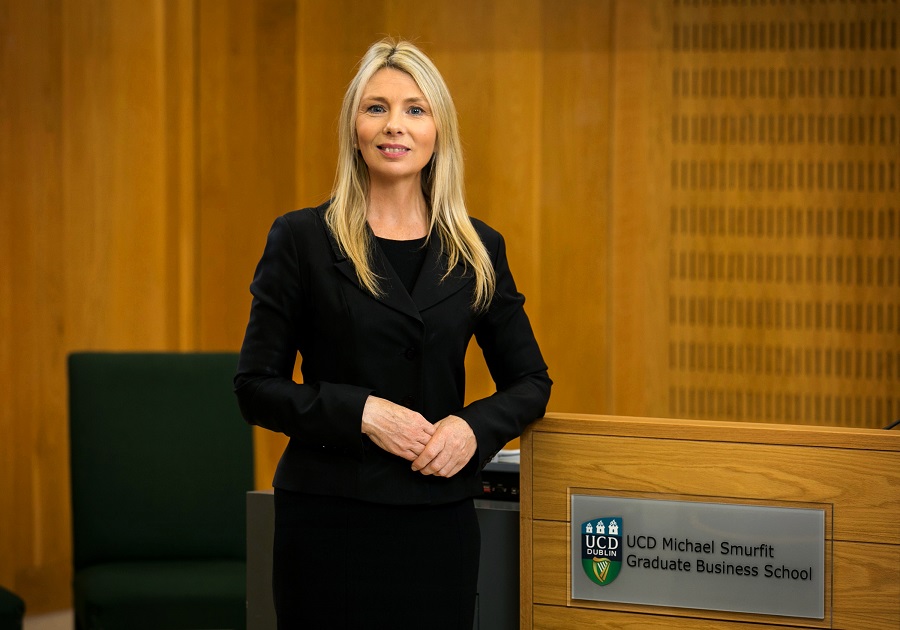“We need planning laws to ban fast food near schools.”
Thursday, 5 October, 2023
Along with her work tackling childhood obesity, Prof Gerardine Doyle, who has recently served a five year term in the role of Associate Dean of the UCD College of Business and Director of the UCD Michael Smurfit Graduate Business School, is currently on research sabbatical at Harvard Business School, working on a comparative analysis of the care of children with cystic fibrosis across the US and Ireland and a new study around burnout in the health sector and managerial interventions to reduce burnout. She is the next guest on the 15-minute UCD Human Health, Impact and Technology [HHIT] webinar series on Tuesday, October 17th, 2023, 2pm - 2:15pm, hosted by Prof Patricia Maguire.
Register (opens in a new window)here.

It is a statement as stark as it is concerning: Ireland has one of the highest rates of childhood obesity in the world. An astonishing one in five Irish children is obese, which equates to 300,000 children; a figure that, every year, rises by 10,000 and costs the State in excess of €1 billion.
The EU-wide, Horizon 2020 study (opens in a new window)Big Data against Childhood Obesity (BigO) used an app to track the movements of over 25,000 school and age-matched obese children from Ireland, Greece and Sweden.
“Children and teenagers used this app to record what they do on a daily basis. For instance, how long they spent watching TV or playing sport,” says Gerardine Doyle, one of the study’s Principal Investigators, and Professor of Accounting and Taxation at the at UCD College of Business.
“There was a GPS component to the app that provided data on the number of fast food outlets in an area, reflecting the opportunities that children and adolescents have to access unhealthy food on the way to and from school or on their lunch breaks. It seems quite logical that we need to tackle such access to unhealthy options however it is not being tackled at policy level in terms of, for example, not granting planning permission to fast food restaurants within a certain radius of where children would be commuting to and from school.”
"There was a GPS component to the app that provided data on the number of fast food outlets in an area, reflecting the opportunities that children and adolescents have to access unhealthy food on the way to and from school."
The app also highlighted the ready availability of unhealthy food options at sporting venues and other places where children and young people congregate.
“One of the issues that came out very strongly was our built environment, so that is a key area where governments can intervene,” says Prof Doyle.
A number of Irish schools were involved in the BigO project and volunteers included users of the Child and Adolescent Weight Management Service in Children’s Health Ireland.
The main aim of the BigO project is for its sensor technologies to provide key data to help inform and develop effective obesity prevention efforts in the future.
Previous prevention efforts include Ireland’s sugar sweetened beverage tax, introduced in 2018 in the face of rising obesity levels. The so-called ‘sugar tax’ was imposed on manufacturers and importers rather than on the consumer.
“One impact of the tax is it has encouraged some of these manufacturers to change their formulations, to reduce the proportion of sugar per millilitre of liquid,” notes Prof Doyle, who would prefer to see monies raised from this tax ring-fenced for children’s education and health literacy, as it is in Philadelphia, USA.
The earlier children and their parents learn about healthy eating habits and awareness of our obesogenic environment, she emphasises, the better.
“Obesity has a detrimental effect on children and teenagers’ health and wellbeing, their future health, their psychological health. It is also, ultimately, a huge potential burden on our healthcare system in terms of the long term care of chronic disease resulting from obesity at such a young age.”
“Obesity has a detrimental effect on children and teenagers’ health and wellbeing, their future health, their psychological health. It is also, ultimately, a huge potential burden on our healthcare system in terms of the long term care of chronic disease resulting from obesity at such a young age.”
This includes Type 2 Diabetes whose serious complications can include heart attack, stroke, foot disease, eye disease and kidney disease.
“So there is an imperative on governments to intervene and to intervene in as many ways as possible. There isn't any one solution to obesity. The sugar sweetened beverage tax just tackles those sugary drinks. We also need planning laws around where fast food outlets are selling unhealthy food to ensure they are not doing so in close proximity to schools, sporting venues and other places attended by children.”
Prof Doyle is now working on another study dealing with children’s health; this time focusing on cystic fibrosis. Ireland has the highest incidence of cystic fibrosis in the world.
“It's a study that commenced the last time I was a visiting scholar at Harvard Business School in 2017. We have collected data in Boston Children's Hospital and in Children's Health Ireland, and have performed a comparative analysis of the process of care and the health outcomes of the children.”
While noting that there are things Boston can learn from Ireland, and vice versa, she concludes: “The data demonstrates that in a number of ways we are doing better in Ireland.”
Register (opens in a new window)here to see Prof (opens in a new window)Gerardine Doyle on the HHIT Series.